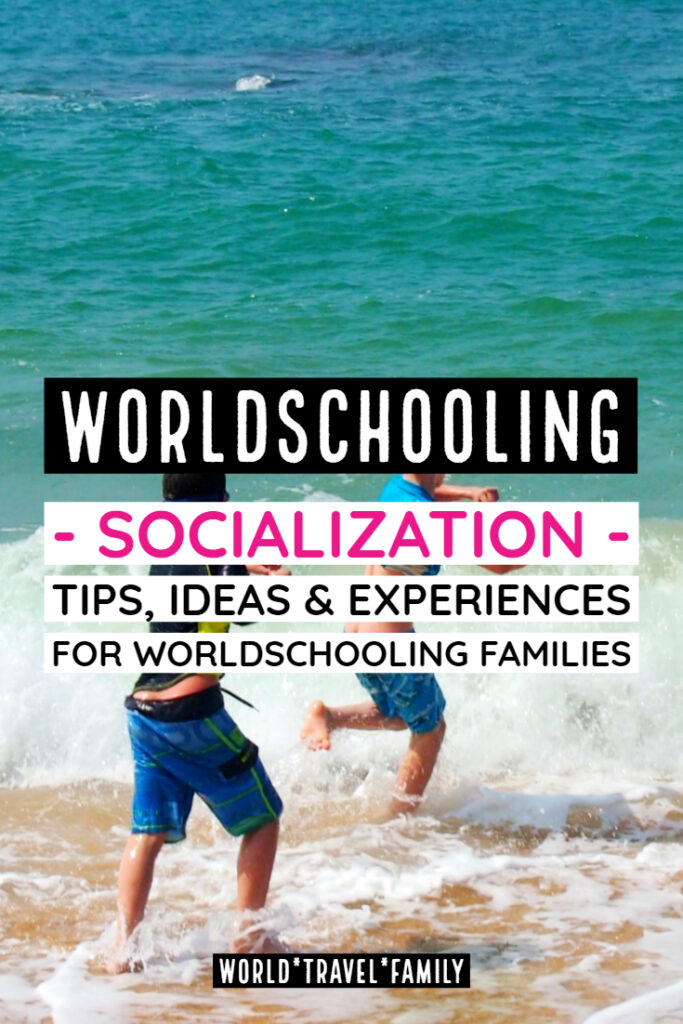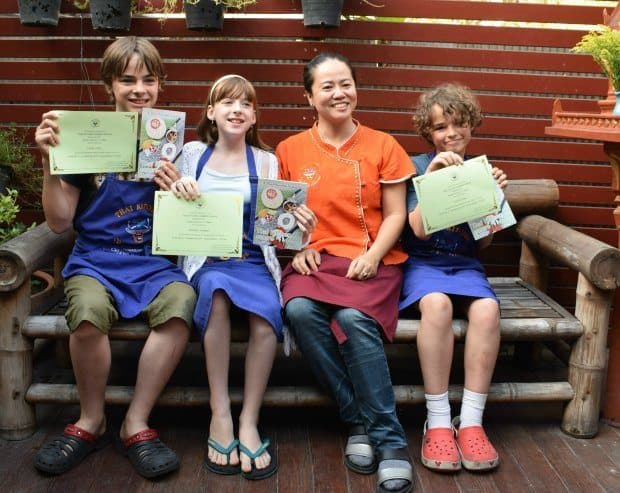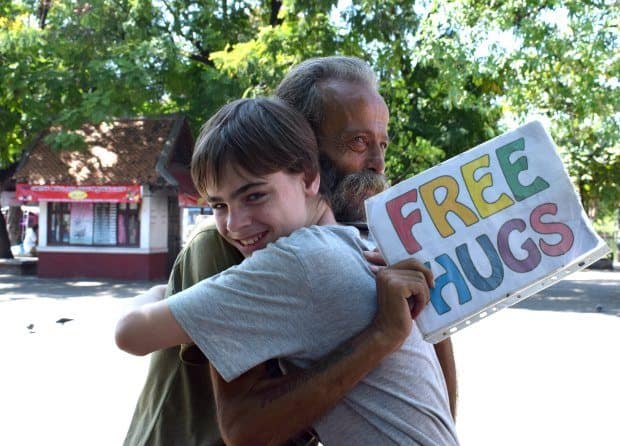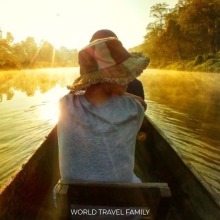I received an e-mail from a reader recently. He and his wife were thinking of taking their child on a travel adventure, a taste of worldschooling, but were concerned about socialization. They thought she wouldn’t “get enough socialization away from her friends” and asked for my opinion. It’s an interesting question. Homeschool socialisation ( and here worldschool socialisation) isn’t something that’s ever bothered us. It seems to bother non homeschoolers an awful lot more.
Here we’re obviously taking the word socialization in it’s simplest form, hanging out with friends. That’s not really what it means, the sociological definition is about acquiring the habits and beliefs of your social group or community, or something like that.
It’s not something I spend a lot of time worrying about, particularly as we flit between multiple societies where those norms differ hugely.
The Homeschool Socialisation Myth
There’s this great myth around homeschooling that kids brought up outside the school system are somehow missing out on socialising or socialisation. We call it “the S word”. It seems to be the most asked question of home-ed families standing in supermarket checkout queues.
In my 10 years as a homeschool mum, nobody has ever asked, so I’m wondering if the question is actually as mythical as it is weird. But what does happen, often, is I get asked the question above in e-mail enquiries, almost always from parents of children who go to school or are too young to go to school.
These are the parents with the school way of life so deeply engrained from their own childhoods that they can’t imagine any other way of growing up. Children are not better off socially in school. Children in school have forced association with a bunch of kids and an adult that they may or may not like. if one of those kids is a nasty piece of work, they’re stuck with them for years. If the teacher is a bully – tough.
In adult life we can choose our company. School kids’ socialisation is actually greatly restricted by being trapped in a box all day. I don’t know why more people don’t spot that. The real world with its glorious diversity of people is outside the school gates.
How Much Socialisation Does a Child Need?
How much socialisation do you need? Can you measure it? I doubt your social need will be the same as mine if you’re a party-loving extrovert.
I suspect that some knowledgeable person has blown their research budget studying this at some point but their results will always be an average because everyone is different. Their research will no doubt be based on kids in school. Kids in school are different to free-range kids.
Have you read that famous piece about caged giraffes? It talks about giraffe research based on giraffes in captivity. Eventually, the researches recognised that caged giraffes and wild giraffes were very different.
Learning Social Skills and Habits
Learning how society runs is much better learned from adults than from a schoolyard group of children, don’t you think? Kids not confined to classrooms will learn accepted manners, respect and empathy. They’ll also experience negative socialisation skills. They’ll recognise unpleasant adults with antisocial behaviours and see that this just doesn’t work in the real world. They’ll be free to go to the places adults go and learn how to behave appropriately. All they learn in school is how to behave and get by in school.
The real world is outside the school gates. If school is preparation for the real world – why not just not leave the real world at all?
Socialisation for Worldschoolers

I thought I’d share my answer to the reader’s letter above because a lot of you must wonder how it works for full-time homeschoolers, family travellers or worldschoolers. Remember we travelled full time for 6 years and were rarely slow travellers.
We are whole life homeschoolers, this wasn’t a gap year and my kids were not pulled out of school and put back in afterwards. Being in school does seem to change kids and their feelings of social need.
I haven’t prettied the email up to make a blog post, this is more or less how I wrote it, without thinking too much. I don’t have all the answers, I’m not the authority but I was asked for an opinion so I gave it. I can only know how my own kids handle it and how I would have handled it had it been me.

Will Homeschooled or Worldschooled Kids Get Enough Socialisation?
Thanks for a great question, I’ll do my best to answer it briefly. If your child is already in school and finds that hanging out with classmates in break time is the norm, she may miss it. Most school kids do miss it. If however she had always been out of school, or didn’t enjoy school she won’t miss it at all and will far rather be off school. Does she prefer weekends and school holiday or school days? I know which I preferred.
In terms of “enough” is there such a thing? She is probably not gaining anything developmentally ( I haven’t looked this up, just a hunch) from being around other kids, it’s just something she does. It’s not normal nor required to be in a class full of same-aged children. It’s far more normal to live life in the real, mixed, world than in a segregated institution.
So really, there’s no answer here, I think you need to think about why and what exactly you mean by ” not enough”. I’m not really sure so I’m trying to cover multiple bases.
Nothing bad will happen to her, I don’t think. She may say she’s bored and throw her lack of available friends at you as a reason. My kids often say they’re bored when I won’t let them use computers. It’s good for kids to be bored, they say, it promotes creativity. I don’t hold with the cliché about only boring people being bored. That’s nonsense, I’m bored a lot, it prompts me to find something to do like being hungry prompts me to eat.
I can tell you for sure that my two are extremely happy, friendly, socially adept kids who interact well with most people. One is naturally shy and you need to get to know him first. I’m the same, that’s fine. They certainly haven’t missed out on anything.
In many ways, they are more adult, more mature, with better vocabularies, views on adult topics etc because they DO spend a lot more time with adults chatting. I’m not sure if that is a good thing or not but they do OK on it. They don’t just spend time with us, but many friends, and acquaintances of all backgrounds, all nationalities, all educational levels and attainments. Today, for example, they are out with a 30 something architect friend “helping” him with a house project. He is their friend. Friends don’t have to be the same age and that in itself is an important lesson for them to learn.
Also, of course, they have times when they just go crazy with other kids with Nerf guns. There are kids everywhere if you want to find them. We have intensive days or weeks of play and other child company when we stay with or near families, at other times we are fairly quiet and antisocial. I need that quiet time, as does my younger son, my elder not so much, but he does enjoy time to himself to work on things he enjoys in peace.
So no, lack of social opportunities with same-aged kids has never been an issue, but I must say it’s a lot easier for them to find playmates in countries where English is widely spoken. This was incredibly noticeable this summer during our time in England and Wales, we were far more socially active than normal. Language barriers with kids are a problem, no matter what others say, and one that my two have never really enjoyed.”
I am no expert on this and EVERY CHILD IS DIFFERENT, but mine are fine, well and happy.
I love what Charlotte has to say on the subject, she is another of their friends and they loved hanging out with her for one glorious summer in Romania.
It’s not my bailiwick as a childless but I agree and can wholeheartedly say both Boo and D are some of the easiest PEOPLE not adult or child or whatever to socialize w I’ve met – ever!
Charlotte, Washington DC. Yale grad
What My Travelling Kids’ Social Life Looks Like

- They have each other, they are both boys, they don’t go to school, they are close. This is important.
- They have very good friends, also boys, also homeschooled, in London, we visit often for days on end.
- They had good friends through homeschool group back in Australia, we’ve lost touch.
- In London we also attend various homeschool meetups and sometimes, Forest School, bumping into the same kids over and over again.
- When we travel, we meet people, including children. Some they get on with, some they would rather avoid. You can’t just throw kids together and expect them to get on. For this reason we’re not keen on arranged meet-ups with strangers.
- There is some Skype communication and emailing, but mostly they can’t be bothered.
- They chat to other kids around the world via Minecraft Homeschool and other online and gaming platforms.
- They enjoy hanging out with people of ALL AGES, it doesn’t have to be just kids.
- They socialise in an almost identical way and to the same extent, as I do.
What You Can Do For Your Kids Social Life on The Road

- Go to places kids gather, playgrounds, swimming pools, anywhere.
- Organise meet-ups with other travelling families, it’s easy to do if you want to do it, find them online.
- Model social behaviour, talk to people, say hi. Encourage fearless interaction but don’t force it.
- Stay in accommodations with shared restaurants, bars etc, places where people chat. Hostels even, but we find hostels expensive.
- Cruise ships, any sort of boat, are a great place to meet other people and be thrown together for days or weeks.
- Avoid countries with a language barrier if you want them to interact with locals.
- If you’re staying a while in one place, sign them up for clubs and courses if they want that, but don’t force them!
- Small group tours and holidays are a great way to meet people. I met my husband on a group tour in Egypt. Bhutan and Tibet were group tours. These tours are an awesome way to see a lot, fast, with no stress or organisation.
- Volunteering is a great way to meet people and learn. We love Tangaroa Blue for this.
- Leave them be. If they want to find other kids to hang with, they will.
Travelling Kids Will Have A Lack of Deep Roots in Society
Yes this is true. Obviously we don’t care. The society we’re in today won’t be the society we’re in tomorrow. My husband and I grew up on opposite sides of the world and now live a very long way away from old friends and family.
Most people we know moved away after school and university. It doesn’t bother us. We did not want our kids putting down roots that could be hard to cut through later, freedom and detachment, lack of dependency are very important to us. Maybe we’re unusual in that.
Remember we are whole life nomads because it’s what we love, we’re not just going on an extended holiday. The kids that go on gap years probably won’t be affected by this at all.
What do you think?
So that’s basically how I replied, a little longer because I have more time and I’ve added a few paragraphs. I’m not very comfortable with this stuff as it’s all opinion-based, I’m far better at fact based travel with kids tips. I’m a scientist, I like data. Now, I’d like to know if you have any questions on this topic, I suspect you do. As I said, I don’t have all the answers but it’s all worked out fine for us and we’re in the exciting phase of launching grown worldschooling teenagers out into the world. It actually surprises me that people ask these sorts of questions, after all, we were out in the real world far more than most. I guess a lot of people just don’t get homeschooling. What do you think? I’d love to hear from you.





Talitha
Wednesday 23rd of November 2016
Hey Alyson, quite a post, this one ... maybe the most controversial you've ever written (though that would not have been its' intention, would it ?!). Making sustainable friendships (the ones that last for decades) is a big challenge for anyone, long-lasting friendships are an essential component for most people's psychological equilibrium (though some manage very well without). You are very right to say friends don't have to be same-age, but for an interesting and sustainable friendship to develop, you need quite some time. Most teenagers need to "hang out" with their peers. I don't agree that a kid doesn't gain anything developmentally from hanging around with other kids. On the contrary! However, I do agree with you that this doesn't have to occur in a classroom. If you have time, have a peek at William Bukowski's "The company they keep" - I believe it's avalaible on Googlebooks.
alyson@worldtravelfamily
Wednesday 23rd of November 2016
I just replied to this same comment on the facebook page. I'm not going to copy and paste. You're right, I see nothing controversial here, just a retelling of our own experiences. Also, we're talking about kids, not teenagers, the 2 are quite different. I'm hoping I'll have a teen ( soon) who still likes mum and dad, at the moment that's working out, but I'm just waiting for the shift that may or may not come. We'll deal with it if it comes, find a new way. Long term friendships don't generally develop before the teen years in my experience, it's impossible without the means or independence to actually get togther and arrange meetings. My friendships over decades are now all gone. That's fairly typical from what I've seen, my friendships of 30, 40 years were unusual and people always commented on that. I always say 30-40 years because I'd known these 4 girls since I was 4. In reality, we weren't friends until we were late teens, we saw each other in school every day, but out of school socialisation has to start later, we couldn't just hop on a bus and go visit, we were dependent on parental cars. Our lives are now too different, our geographic locations too diverse for us to relate. It was inevitable that those friendships would evaporate as we all moved on with our lives. Had we all stayed in our home towns maybe we'd all still hang out together every Friday night, but that's not the way the world is for us. I don't buy into the idea that class mates are friends in any way, it's a lie told to kids to help persuade them to surrender their freedom age 5. I have new good friends now, mostly from the last 1-2 years, friendships that came because of like minded people coming together, not through being thrown together in the same classroom. They are far more enduring and solid, I think, than those of teenage convenience. Tell me what you think kids gain developmentally through classroom interraction with same age kids. All I can think of ...well you can imagine, an interest in whatever, game, fashion, boy band or whatever is currently going around. ( my 2 get this in spades from the internet, agin, times have changed) Also, I never said that any travelling child goes without this, as I said , there are plenty of kids everywhere, if the child wants to find them. Our last few weeks have been totally taken up with other kids. Some my boys didn't enjoy being around, others were an absolute delight, but still they could pretty much take it or leave it. They're cool doing their own thing and that's a bunus of having 2, same sex. Right now they have their aunt with them, next week one of the above mentioned children again, week after back to their London friends then team Romania. That's what they're really looking forward to, our Breb gang, all adults. And that is how it goes. The child above was simply going on holiday for a year. No big deal at all so I considered her father's worries unfounded. Very few travel long term. We do, and we manage it very successfully, if it didn't work for us all we simply wouldn't do it. I presume you've noticed the extended time we spend in London. Our friends live there, so we stay the kids can hang out. In the same way that the above family will return to their friends, wherever they are. But I get very tired of constant social demands, it seems everyone wants a piece of us these days and I can't give it all the time. I need peace and solitude in big doses, it's not unusual.
Rachel
Sunday 23rd of October 2016
Deanne, I am also an introvert with an extrovert child. While we aren't (yet!) permanent travellers like Alyson, we travel frequently, often for 4-6 weeks at a time. My 9yo daughter has had her own email since she was 6, and chooses when to email/Skype her friends, and now does this regardless of whether we are at home or travelling. She makes new 'friends' as we travel - in parks in France and Singapore, at resorts in Thailand and Bali, and has never said she was lonely (tired of temples/'desperate' to watch tv in English yes, but not lonely). She has gained far more by travelling, experiencing the temples of Cambodia or the street art in Penang, eating local food and interacting with people (not just other kids) of different cultures than having a few extra 'play dates' at home. We've been back two weeks from our latest trip, and while she's enjoyed seeing her friends, she's already counting down to our next trip in 6 weeks, and helping me plan for Thailand in 2017. I believe socialising children is about far more than playing with friends; those who have been lucky enough to see other cultures, religions, and ways of life are likely to be far better off socially than those who have a limited range of experiences.
deannelamb
Monday 17th of October 2016
Socialization is one of my biggest worries in planning our upcoming year or so of travel. My younger son is happy to just hang with the family. My older daughter not so much. She loves school and often isn't even in the door before she's begging me to call so and so's mom to see if she can play or go to the park to see if any of the neighbour kids are there. And she's always been this way, even before she was old enough for school. I have to admit, it really is quite stressful sometimes to be a natural introvert with a child who's a born extrovert. I'm considering getting her an Ipad mini or other device to let her keep in touch with friends at home while we're on the road. (she'll be nine when we leave). Do your kids stay in touch with friends online on their own or is it mostly through you?
alyson@worldtravelfamily
Monday 17th of October 2016
They have zero interest in email or Skype Deanne, I force them to send an email to grandparents once in a blue moon, otherwise they never even check it. It's still totally through me and will be until they can make their own arrangements, be old enough to have phones, go places alone etc. Just as it was for me when I was a kid. but I think girls crave the gossip and interraction far more than boys, particularly as I have 2 of them.